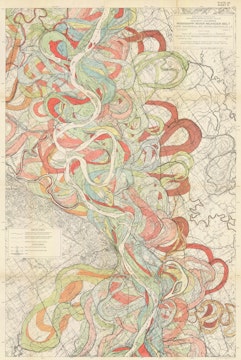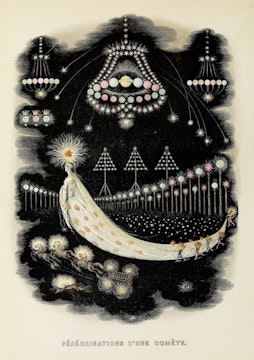
Get Thee to a Phalanstery or, How Fourier Can Still Teach Us to Make Lemonade
Hot on the heels of the French Revolution — by way of extravagant orgies, obscure taxonomies, and lemonade seas — Charles Fourier offered up his blueprint for a socialist utopia, and in the process also one of the most influential early critiques of capitalism. Dominic Pettman explores Fourier’s radical, bizarre, and often astonishingly modern ideas, and how they might guide us in our own troubled times.
May 1, 2019
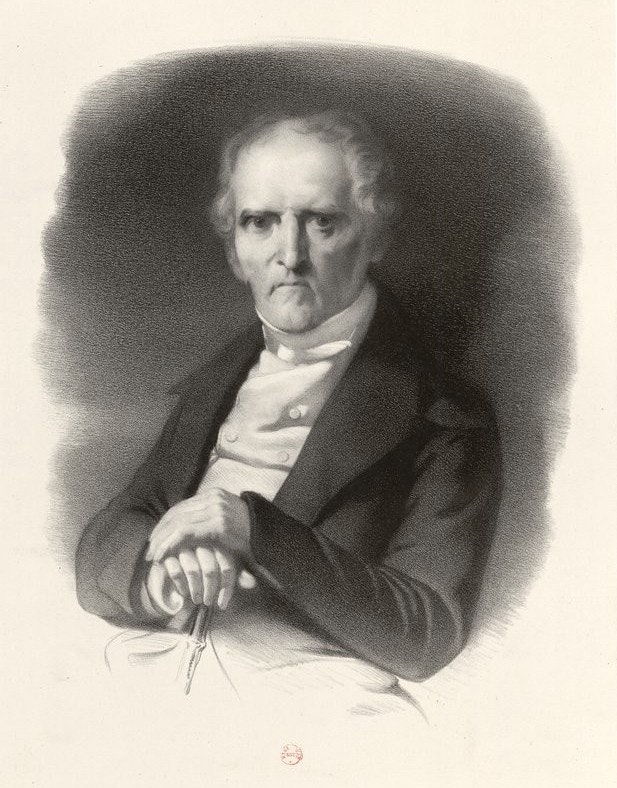 Scroll through the whole page to download all images before printing.
Scroll through the whole page to download all images before printing.Engraving of Charles Fourier, artist unknown, ca. 19th century — Source.
Critical thinkers, like myself, often emphasize the fact that Things Could Have Been Otherwise. Indeed, we like to convey the sense that Things could still be Otherwise, if we just start thinking differently. (And not just “differently” in the manner encouraged by Steve Jobs.) The premise is that society is, well, socially constructed, and that it actually takes a lot of invisible ideological work to keep the foundations of this strange — absurdly unjust — society replicating itself from generation to generation. (An approach known as “social reproduction theory”.) Charles Fourier, the unconventional proto-socialist who wrote at the beginning of the nineteenth century, is, it could be argued, the patron saint of Living Otherwise. He was the first thinker, to my knowledge, to not only critique the status quo, but to spend much of his life mapping out precisely how Things could be so radically different as to be virtually unrecognizable. This is why his name forever features in the pantheon of utopians. His notion of Harmony — an age in which all our present miseries and stupidities will be vanquished, almost overnight, by vastly improved social arrangements — is the first detailed attempt to create a blueprint for an actual existing utopia. A utopia not just for the anointed or the deserving, but for all humankind, united under a new global association of liberated souls (connected by what he called passionate attraction).
It is impossible to broach the topic of Fourier, however, without discussing some of his many eccentricities. So let’s get some of them out of the way from the get-go. He wanted to abolish the number ten. He believed that children could be motivated to happily do most of the labor in our future communes, like Oompa-Loompas. He believed lions and sharks would soon die out, replaced by “anti-sharks” and “anti-lions”. And most famously of all, he claimed a shift in our local cosmic conditions would change the chemical makeup of the earth’s oceans, so that they would taste like lemonade. There is also no shortage of paradoxes in Fourier’s character. He was a businessman who hated commerce. (Or at least the way commerce was practiced in his day.) He was a cosmopolitan universalist, susceptible to selective racism. He was a passionate rationalist and a utopian pessimist (in the sense he believed we live in the worst of possible worlds, but are only a few months away from flipping this scenario on its head). He was a scientific fantasist, a pedantic fabulist, a colonialist abolitionist, a revolutionary thinker who hated and feared revolutions, and a hyper-controlling conductor of freedom. Indeed, reading Fourier is quite a dissonant experience, given that he is as perceptive as he is naïve, and as prescient as he is absurd. (Indeed, I would argue that Fourier is a more amusing satirist than Jonathan Swift, for the simple reason that the former is deadly serious.)
Fourier’s writing smells (pleasantly, to my nose) “of the lamp”, since he was obliged to work late into the night, after working as a traveling sales clerk during the day (mostly in connection with the silk trade of his native Lyon). Even so, he enjoyed a staggering confidence in his own knowledge, and presumed unprecedented mastery of every branch of the human and natural sciences (cosmology, meteorology, geography, anthropology, etc. . . . even theology). Fourier’s most essential claim would have seen him burnt at the stake a century or so earlier: specifically, that all of humanity’s various instincts and passions, including lust, are part of God’s grand design and should not be repressed or stigmatized as sinful. The problem, according to Fourier, is not with our primal urges, but with the way these desires are stifled, stunted, and warped by civilization (a time period in the Western Hemisphere that dates from the ancient Greeks, by his reckoning). Make no mistake, when Fourier uses the term “civilized”, he is not marking a higher state or achievement, but rather hurling an insult with a curled lip. Civilization names a dark age of hypocrisy, disorientation, and universal unhappiness, where even the very rich are imprisoned in simply a more comfortable class of misery than the rest of us. While humanity has made great technical strides, according to our guide, which have led to astonishing leaps in our capacity to exploit nature for profit, we have not paid any attention to our own inclinations, our own souls, our own hunger for freedom, play, sensual exploration, artistic expression, confraternity, and collective erotic interaction. (Where “Eros” is figured not in its reduced form, as merely the sexual, but as the pulse of life and joy which Lucretius believed lies at the origin of life’s spark.) In other words, Fourier provided a fully fledged theory of alienation, several decades before Marx, just as he had a fully fledged theory of repression nearly a century before Freud.
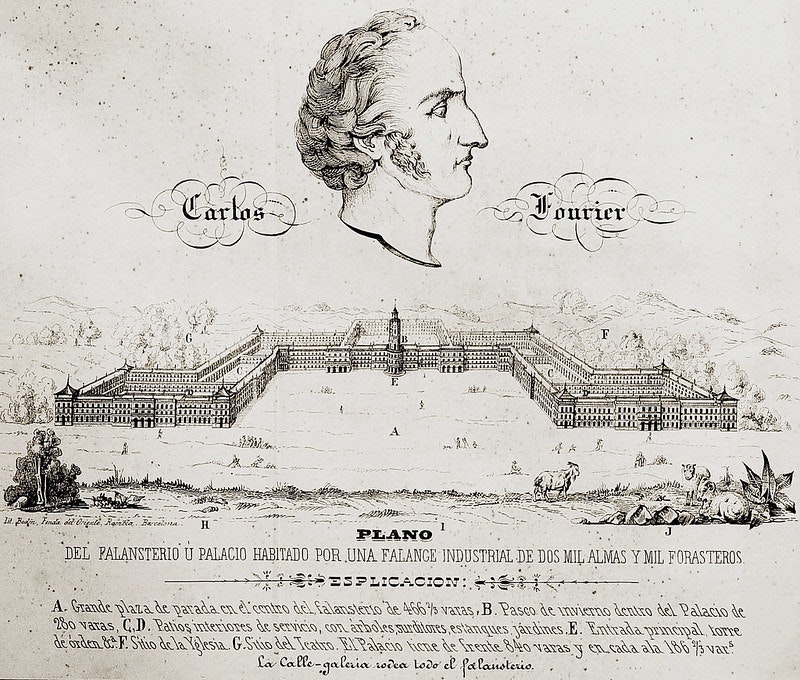 Scroll through the whole page to download all images before printing.
Scroll through the whole page to download all images before printing.Spanish print showing a phalanstery, ca. 19th century — Source.
Fourier was insistent that we need not force a violent revolution in order to usher in a new age; we just need to rearrange some of our social mechanisms and better regulate our intimate relations. Everything else would follow smoothly and swiftly in its wake. Removing obstacles was paramount, and the main obstacles in Fourier’s eyes were what we today call compulsory monogamy, wage slavery, alienated labor, financial insecurity, and finance capitalism. (And also bread. Fourier was not a fan of bread.) By banishing monogamy, people would no longer be obliged to cheat, lie, and sneak. Love, whether spiritual or physical, would be allowed to flourish whenever and however it began to blossom, and bitterness and resentment would subsequently evaporate almost overnight. (Strangely, while Fourier had a great faith in the motivational spur of comradely rivalry, he had little trepidation about the dark power of jealousy as an entrenched human — perhaps even animal — trait.) Wages are, for Fourier, a scourge, and should be replaced by a dividend or share of profits, and no one should be obliged to toil for a pittance. Monotonous work is to immediately be replaced by many different tasks, all vital to the community, and all intimately connected to the sense of worth and accomplishment of the clan. (Or what he called a Series.) Fourier imagined vigorous and friendly competition between the pear-growers and the apple-growers, for instance. But even so, a pear-grower would perhaps move to the woodshop later in the afternoon, before attending a rehearsal of her new play a couple of hours after that, all in order to honor the papillonnage, or butterfly-like caprice, of human attention.
The citizen of Harmony (known as a “harmonian”) would soon live to be 144 years old, need only five hours’ sleep, and be an average height of seven foot, due to the healthy lifestyle, refined superfoods, and overall orgone accumulation of the phalanstery. (While Fourier never used the phrase “orgone” energy, it is difficult to not see its presence at work in the vision of Harmony, from a post-Reichian perspective.) Indeed, Fourier’s vatic description of the phalanstery is a strange mix of the classical (including vestals), the medieval (wandering bards and errant knights), and the Renaissance (“courtly behavior”). It also anticipates the Victorian era (especially the craft-based counter-culture associated with William Morris), as well as the hyper-modern industrial age (utilizing, as it does, state-of-the-art architecture and engineering, such as weather-proof towns and forest-wide irrigation systems).
 Scroll through the whole page to download all images before printing.
Scroll through the whole page to download all images before printing.View of a phalanstery, by Charles-François Daubigny, ca. 19th century — Source.
Among all the remarkable claims in Fourier’s seemingly tireless accounts of this tantalizing collective life, which exists just past our own selfish and self-defeating horizon (to the extent that he sometimes slipped into the present tense when describing it), one in particular stands out as striking. And that is the amazing faith he has in human association itself. Clearly, this thinker has never lived in a group house, or been obliged to sit on a committee, for he believed that a rather relentless public existence would, by its own account, bring us, without exception, a profound and unshakable happiness. (So much so that rich folk would live in a modest house of only three rooms, since they would spend three-quarters of their lives in active social commerce and activity.)
Rich folk, you ask? I thought Fourier was a socialist? Well, this is another one of his many contradictions. While our utopian architect abhorred exploitation, he reserved contempt for the notion of equality. “The associative régime”, he wrote,
is as incompatible with equality of fortune as with uniformity of character; it desires a progressive scale in every direction, the greatest variety in employments, and, above all, the union of extreme contrasts, such as that of the man of opulence with one of no means, a fiery character with an apathetic one, youth with age, etc.1
In other words, variety is the spice of life. And Fourier sought to keep things as spicy as possible. “We must not persuade ourselves that in Harmony mankind are brothers and friends”, he insisted. “It would be robbing life of its salt to cause the shades of opinion, contradictions, antipathies even, to disappear from it.”2 Fourier believed that there were 810 different personality types, so each phalanstery should be comprised of 1,620 inhabitants — one personality type of each sex.
 Scroll through the whole page to download all images before printing.
Scroll through the whole page to download all images before printing.Plan of a phalanstery, featured in A Popular View of the Doctrines of Charles Fourier (1844) by Parke Godwin. The dark grey area is the building itself, the areas marked a, e, o, u, being inner courtyards “ornamented with trees and shrubbery”, and G the main garden with greenhouses — Source.
Fourier’s utopia is thus, at the end of the day, a rather bourgeois one; just as his own writings were written for gentlemen, largely above his own station. (This is partly a reflection of Fourier’s own business model, which was subscription based, so that his writings were sponsored by those relatively well-to-do folks interested in his radical theories, à la left-leaning Patreon or Kickstarter patrons.) Nevertheless, we would be doing him a disservice if we did not acknowledge his astonishingly progressive views on women. Indeed, writing at the very beginning of the nineteenth century, Fourier went so far as to say: “As a general proposition: Social progress and changes of historical period are brought about as a result of the progress of women towards liberty.”3 Fourier is even credited with coining the word “feminism”. Of women, he asked,
Is there a shadow of justice to be seen in the fate which has befallen them! Is a young woman not a piece of merchandise offered for sale to whoever wants to negotiate her acquisition and exclusive ownership? Is not the consent she gives to the marriage bond derisory and enforced upon her by the tyranny of all the prejudices which have beset her since childhood?4
In one especially perceptive passage, Fourier noted:
[Men] even debase the female sex by their flattery of it, for what can be more inconsistent than Diderot’s claim that to write to women ‘you must dip your pen in the rainbow and sprinkle what you have written with the dust of butterfly wings’? Women might reply to the philosophers: your Civilisation persecutes us if we obey nature; we are obliged to behave artificially, and to attend only to promptings that go against our desires. In order to make us swallow your doctrines you have to play on our illusions and use the language of deceit, as you do with soldiers when you lull them with promises of laurels and immortality to make them forget their wretched situation. If they were really happy they would welcome being addressed in straightforward, truthful language of the sort which you are very careful to avoid. The same goes for women: if they were free and happy they would not be so eager to embrace illusions and cajolery, and you would not need the help of the rainbow and butterflies to write to them. If the military and the female sex, in fact the whole of the common people, have to be deluded all the time, then that is a serious indictment of philosophy for failing to organise anything in this world except misery and servitude. And when it mocks women’s vices it is actually criticising itself, for it is philosophy which produces these vices through a social system which represses women’s rights and abilities from childhood and throughout their lives, forcing them to resort to deception if they are to obey their natural impulses.5
The “free women of the combined order”, Fourier assured his readers, “will surpass men in their dedication to work, in loyalty and in nobility.”6
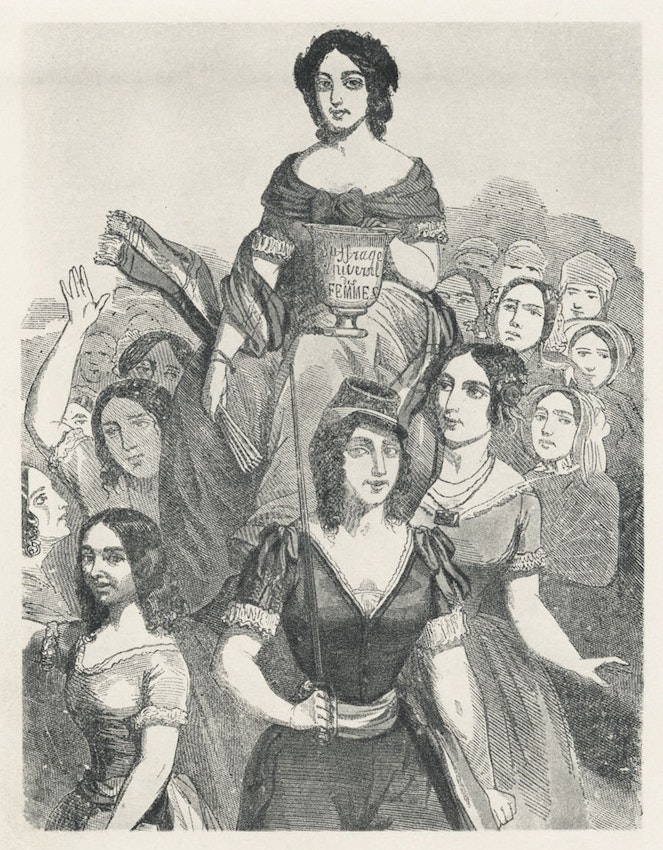 Scroll through the whole page to download all images before printing.
Scroll through the whole page to download all images before printing.The French socialist feminist and “Fourierist” Jean Dorian, held aloft by women of different classes, with a chalice that reads, “Suffrage Universal des Femmes” (“Universal Women’s Suffrage”) — Source.
Fourier’s singular relevance for our own vexed moment is not restricted to his critique of political economy, nor to his early advancement of the feminist cause, but includes also his attention to matters of climate and environment. Fourier thus offers us a precious gift, in his reminder of the intimate relationship between the domestic sphere, wider society, and the cosmos itself. (In this sense, he is a kind of centaur — half Emily Post, half Georges Bataille.) Fourier was alive to “the influence of human cultivation upon atmosphere and climatic conditions”.7 His philosophy was somewhat inconsistent on this theme, however, as he was torn between being sensitive to the environment and reshaping it to our needs. He lamented the rapine of the environment, on the one hand, while he advocated vast changes to the natural world, on the other. “We bring the axe and destruction,” he wrote
And the result is landslides, the denuding of mountain-sides, and the deterioration of the climate. This evil, by destroying the springs and multiplying storms, is in two ways the cause of disorder in the water system. Our rivers, constantly alternating from one extreme to the other, from sudden swellings to protracted droughts, are able to support only a very small quantity of fish, which people take care to destroy at their birth, reducing their number to a tenth of that which they ought to produce. Thus, we are complete savages in the management of water and forests. How our descendants will curse civilisation, on seeing so many mountains despoiled and laid bare.8
And yet,
[T]he combined order will undertake the conquest of the great Sahara desert. It will be attacked at several points by 10 or 20 million hands, if necessary, and by dint of importing earth, and gradual planting and afforestation, they will succeed in humidifying the land, stabilising the sands, and replacing desert with fertile regions. There will be ship canals in places where today we cannot even create irrigation channels, and great ships will not only sail through isthmuses like Suez and Panama but far inland.9
Fourier looked forward to planned human interventions creating vast changes in the world’s “natural infrastructure”, if we can call it that. But he approached this in terms of making the planet more hospitable for habitation. He was not interested in exploitation without replenishment, as we still proceed to do, even today. The problem, in Fourier’s view, was not so much scale, but execution. The world should be radically changed, to allow for greater cultivation, since nature exists primarily for the delight and benefit of humankind. But any such changes should only be made in sympathy with the tendencies and desires of the planet itself. Our ambitious Frenchman was thus an early advocate of what we now call geo-engineering, though he would have been horrified at the scale and method of the works currently being conducted in China, West Virginia, Australia — indeed all over the world.
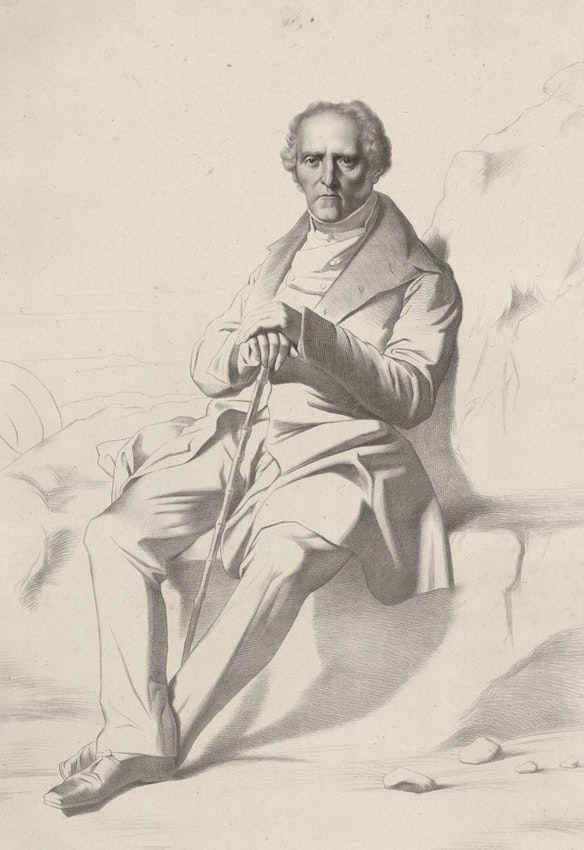 Scroll through the whole page to download all images before printing.
Scroll through the whole page to download all images before printing.Portrait of Charles Fourier, a lithograph by Philibert Léon Couturier — Source.
As for global warming, this was yet another item ticked off of Fourier’s prophetic checklist, down to the detail of the polar ice caps melting. For Fourier, however, this was far from a negative thing. While he was right about a marked increase in global temperatures, he could not have been more wrong about its effects, since he looked forward to a universally temperate, gentle, and pleasant climate (“The transformation of the polar winds into zephyrs . . .”10), and the opportunity it would afford to cultivate forests at unheard of latitudes. Each generation subsequent to the establishment of Harmony, he predicted confidently, “will see a very sensible bettering of its climatic conditions, thanks to the power which Association possesses of again covering the mountains with trees, judiciously distributing waters and forests, ponds for irrigation, and all branches of cultivation”.11 While sparse with details, Fourier believed we could transform the planet into a new Garden of Eden. Our anthropogenic influence, however, would not stop short of the earth and its atmosphere, since, by some kind of unexplained cosmic entanglement of influence, new moons would show themselves in the sky, and — most importantly of all — a crown of benign light and energy would descend over the Northern Pole.12 (A crown which would render the seas into lemonade, and allow agriculture over the entire globe.) The only reason our planet does not at present enjoy regal rings, like those of Saturn, is, according to Fourier, due to the fact that our civilization is so “impoverished” that we don’t deserve them yet. (He also took it for granted that aliens on other planets were far more evolved than we are, and that we are the slow kids on the cosmic block, having been mired in incoherency for so long.) Fourier even believed that the Earth itself would sometimes find itself “in heat”, like an animal:
This can be seen from the frequent appearances of the aurora borealis, which are a symptom of the planet’s being in rut, a useless effusion of creative fluid, which cannot conjoin with the southern fluid as long as the human race has not carried out its preparations.13
A reader of Malthus, Fourier considered the question of population to be key. He believed that the human race — once freed from the yoke of civilization — would first grow rather rapidly, and then stabilize at a sustainable number, thanks to a kind of innate, biological reduction in fertility rates. “Luckily”, he wrote, “the earth is vast in proportion to its small population; we are still only one-third of the globe’s proper number, with our small total of 2 billion.”14 Nevertheless, he added, “it will take only 150 years for the earth to be populated to its FULL CAPACITY”.15 While the prospect of overpopulation was one of the various specters haunting Europe in the nineteenth century, Fourier had great faith in the self-regulating mechanisms emerging from this new age. “After three generations of Harmony,” he pronounced, “two-thirds of the women will be unfruitful, as is the case with all flowers which, by the refinements of cultivation, have been raised to a high degree of perfection.”16 Thanks to a combination of “the vigour of women”, “integral exercise”, enlightened morals, and a new, healthier “gastrosophic régime”, children will arrive in Association at the same rate as people leave this mortal coil, and no more. (Quite the feat, given the elaborate orgies planned in the Phalanstery.)17
 Scroll through the whole page to download all images before printing.
Scroll through the whole page to download all images before printing.Before the Deluge (1615) by Cornelis van Haarlem — Source.
A hundred years ago, Sigmund Freud introduced us to the idea of “libidinal economy”.18 That is, the psychosocial modes of exchange, saving, and spending that we all negotiate on a daily basis. Any emotional investment you make in a person or project, for instance, in the hope it will make you happy, or more psychologically enriched in some way, is an example of your contribution to the wider libidinal economy. Even a stolen kiss is factored into the general accounting, theoretically speaking. Given that both microeconomics and macroeconomics depend on wants, needs, hopes, desires, etc., we can confidently claim that all economies have an erotic component, if we trace it back carefully enough. (Although, yes, sometimes a longterm capital gain dividend is just a longterm capital gain dividend.) Having tarried with the work of Fourier, I would like to float the notion of a “libidinal ecology”, that is, a more expansive conceptual lens than Freud’s, to better understand what is now called “the anthropocene”, or the measurable, rapidly accelerating human impact on the wider environment.
Fourier — whom one critic notes, “everybody knows . . . [but] nobody has read”19 — helps us understand the intimate link between economic and ecological concerns and behaviors. Economy was originally the spontaneous science of organizing the household (oikos). This involved not only distribution of domestic labor, but balancing budgets, exchanging services, regulating conditions, managing resources, recycling materials, processing waste, and so on. Given that economy begins in both bedroom and kitchen, it is inherently libidinal. It is fundamentally a matter of gender, sex, desire, as well as the kinds of contracts and obligations these, in turn, engender. Freud understood the inescapably transactional nature of erotic experience — you cannot get a free lunch, so to speak; and intense pleasure always comes at a price. But the father of psychoanalysis declined to map the “actual” economic sphere on to the sexual sphere with the insight and persistence of Fourier. He did not show, as the silk merchant from Lyon did, how these are in fact one single sphere, how they are one and the same body. In attempting to manifest justice in both spheres of love and economics, in a radically transformed world — both socially and geographically speaking — Fourier went a step further: he demonstrated the interpenetration of economy and ecology (before the latter term was even invented).
Now that “nature” has moved from the background of human affairs and become a fellow protagonist (or even antagonist) — with its own evolving concerns, and perhaps even its own destiny — ecological consciousness has given age-old questions a new tone and urgency. Fourier looked forward to the melting of the ice caps, because he believed this would open up new vistas for sustainable farming, and with it, a new generalized conviviality. He was wrong about the climatic effects and social repercussions of such major anthropogenic changes. But he was right that we need to invent radically new economic relationships in order to survive and thrive as a species among others. This means essentially banishing the profit motive from all aspects of society, from the boardroom to the bedroom. This means understanding our own natural impulses, and not shoe-horning them into compromised cultural shapes and arrangements. This means cultivating a sustainable libidinal ecology. One which honors and includes “the infinitely small as well as the infinitely great . . . the infinitely ridiculous as well as the infinitely charming”.20
Fourier — not despite his eccentric imagination, but precisely because of it — was a brilliant, far-sighted libidinal ecologist: one who understood the dangers of prioritizing avarice and vulgar materialism over a sustained, collective holistic attention to ars erotica and what the French philosopher, Bernard Stiegler, today calls “savoir vivre” (knowing how to live). While there were several attempts after his death to realize Fourier’s projections, and found actual phalansteries (including Brook Farm, near Boston), these of course never quite got off the ground. Nevertheless, his spirit entered the conceptual groundwater, and we can see his influence waxing in the free love of the 1960s, as well as the polyamory and queer sex-positivity of today. Many on the left today, for instance, look forward to what they cheekily call, Fully Automated Luxury Gay Space Communism. If these kinky comrades and cosmonauts have not yet settled on a symbolic founder, they could hardly find a more well-suited one than this humble, arrogant, grumpy, tireless, visionary crypto-Calvinist Dionysian.
Dominic Pettman is Professor of Culture and Media at Eugene Lang College and the New School for Social Research. He is the author of numerous books, including Creaturely Love: How Desire Makes Us More, and Less, Than Human (Minnesota, 2017), Sonic Intimacy: Voice, Species, Technics (Stanford, 2017), and — with Carla Nappi — Metagestures (Punctum, 2019).


